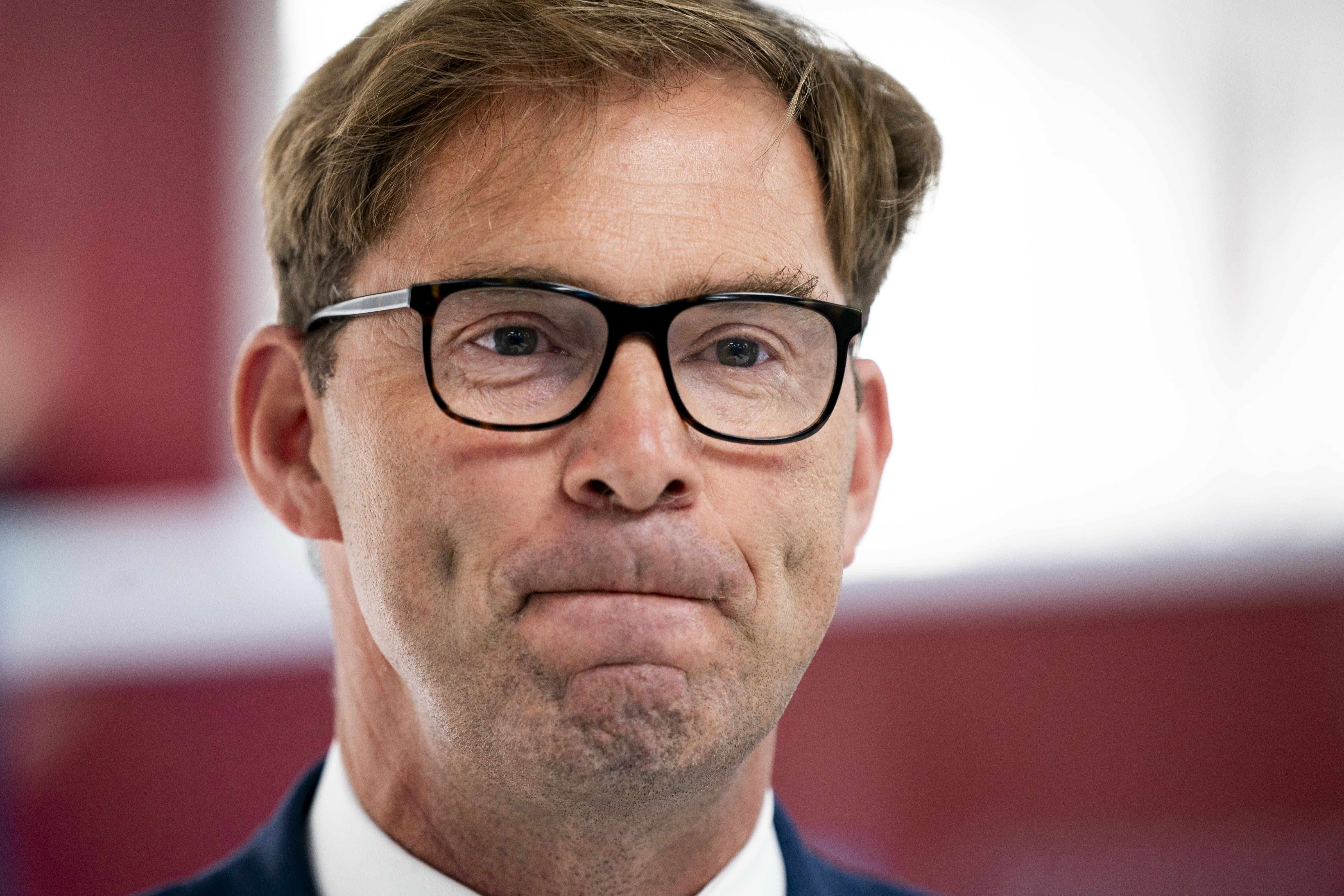Dare I say it, Tobias Ellwood wasn’t entirely wrong about Afghanistan…
The MP came a cropper for appearing to praise the Taliban. He was certainly guilty of speaking before thinking, writes Mary Dejevsky. But his real crime was in challenging UK political orthodoxy


Heroes have a habit of getting themselves into trouble, and their tendency to brave impetuosity is a reason why. Tobias Ellwood, MP for Bournemouth East for the best part of 20 years, and the chair, until a week ago, of the parliamentary Defence Select Committee, is one such hero.
He was propelled to public attention on 22 March 2017, after rushing to the aid of PC Keith Palmer, who had been stabbed in an attack at the gates of parliament. A former soldier, Ellwood gave mouth-to-mouth resuscitation and CPR to Palmer, but was unable to save the police officer’s life. Footage of the MP’s desperate efforts, and his bloodied face, led the news and he received widespread acclaim for his courage, not least because his immediate response put his own life in danger.
Acting – or speaking – first and thinking afterwards, however, has its downsides. It has landed him in hot water before, which may help to explain why he has never made it beyond junior minister. Three years ago, however, at his second attempt, he was elected chair of the Commons Defence Committee – a job that was perhaps a better match for his undoubted strengths than a cabinet post. Here he became a doughty – and eloquent – advocate of the UK’s military support for Ukraine, while insisting at times (in my view, I have to admit, recklessly) that it should go a lot further and faster than it has.
On Ukraine, at least, Ellwood remained for the most part “on-message” so far as government policy was concerned, despite the changing cast of prime ministers. It was on Afghanistan that he came a cropper.
A few weeks before parliament’s summer recess, Ellwood went on a week’s trip to Afghanistan organised by the UK mine-clearing charity, the Halo Trust. Afterwards he put out a video on social media, where he praised the Taliban rulers for “vastly improving” security, starting agricultural reform, and encouraging the use of solar energy. His bottom line was that the UK should “engage” with the Taliban to prevent Afghanistan becoming a “Chinese vassal”.
Of course, what Ellwood saw was but a partial view. But the fact is that, post-withdrawal, Afghanistan has mostly not been the catastrophe that was widely predicted
Now, it never ceases to amaze me how incautious politicians can be in their use of social media. A built-in delay on any tweet might be a useful mechanism for every politician concerned to keep a job. Whether such a delay would have saved Ellwood from himself in this case, however, might be another matter, because he clearly believed what he was saying; after all, he was only reporting what he had seen with his own eyes.
That he had actually visited Afghanistan, however, counted for nothing. His video was met with a barrage of condemnation – from Conservative hawks, led by Sir Iain Duncan Smith, on the one hand, to human rights charities, on the other. Within days, Ellwood had put out another statement, apologising for what he called his "poor communications" and saying: “I’m very, very sorry that my reflections of my visit could have been much better worded and have been taken out of context".
Whether you see this as a genuine re-think or a “non-apology apology”, hardly matters. It was not enough for Ellwood to save his job. Members of the defence committee tabled a motion of no confidence in his chairmanship, with a vote postponed until the autumn. Over the summer, Ellwood obviously “did the maths” and, on 13 September, the day before the committee was to reconvene, he fell on his sword.
This is regrettable. Ellwood would have done better to stand his ground. His continued chairmanship might – would – still have been untenable, but the reason he was essentially forced out was not that his observations were wrong, but that what he was reporting and advocating fell foul of UK policy orthodoxy. This holds that Afghanistan has been in utter chaos since the Taliban took over; that the place is a medieval hellhole, especially for women; and that on no account should “we” talk to the Taliban, lest this seem to lend the regime some legitimacy.
The difficulty is that, as Ellwood found, that orthodoxy is not – or at least not entirely – true. It also leaves the UK’s view of Afghanistan frozen where it was immediately after the enforced Western withdrawal and offers no way out of the present impasse.
This time two years ago, the US and the UK were licking their wounds and contemplating not just the chaos they had left behind in Kabul, but the ruins of a 20-year-old Afghan policy designed, among other things, to keep the Taliban out of power. When, in an early post-election move, President Biden decided to proceed with Donald Trump’s agreed Afghan withdrawal, neither the US nor the UK anticipated how totally this would undercut their client government and how quickly the Taliban would sweep to power in Kabul. The result was the mayhem at Kabul airport in August 2021.
While those pictures linger in the memory, it may be forgotten that at this point the US – though not the UK – was talking to the Taliban. Just a week before the last US plane left Kabul, the head of the CIA, William Burns, was sent on a secret mission to do just that. The purpose may have been to protect evacuation flights out of Kabul and limit the disorder at the airport. At that stage, though, there was direct contact.
Since then, on both sides of the Atlantic, the policy has prevailed: there must be no talking to the Taliban. This is despite there being plenty to talk about, on both sides. On the UK side, it could include help for interpreters, say, to leave safely, without needing recourse to people-smugglers and “small boats” – and, yes, the rights of girls to go to school. On the side of the Taliban, it might be requests to unfreeze funds and increase aid.
Of course, what Ellwood saw was but a partial view. But the fact is that, post-withdrawal, Afghanistan has mostly not been the catastrophe that was widely predicted. It has not collapsed; it has not been engulfed in chaos, nor succumbed to famine or plague. Many regions are at peace for the first time in very many years, and that includes Helmand province, where the British notoriously failed either to bring order or to curb opium production, while becoming targets themselves.
Two years on, is it not time to reconsider our non-recognition of the Taliban – less to keep Afghanistan out of the clutches of China (though if that argument works for Sinophobic Tories, so be it), than to try to improve the lives of Afghans? Some international aid organisations – Halo being one – and some Scandinavian charities, too, have found ways of working within current constraints, and that includes getting help to disempowered and impoverished women.
But it also has to be recognised that rights, including women’s rights, will be worth nothing, so long as people fear leaving their homes because of the lawlessness outside – think Baghdad in 2003. If the Taliban are bringing peace to areas hitherto ravaged by war, this provides a basis for a conversation that was not there before. It needs to begin.
Tobias Ellwood is an MP of whom there are too few in parliament: someone with an international background, someone with a wide range of experience, including in the military, and someone with experience of sudden personal loss – his brother was killed in the Bali bombing. He is also, as we know, physically brave. Given all these assets, it is a pity he did not defend his case for engaging with the Taliban. It was – and remains – a case worth defending.



Join our commenting forum
Join thought-provoking conversations, follow other Independent readers and see their replies
Comments